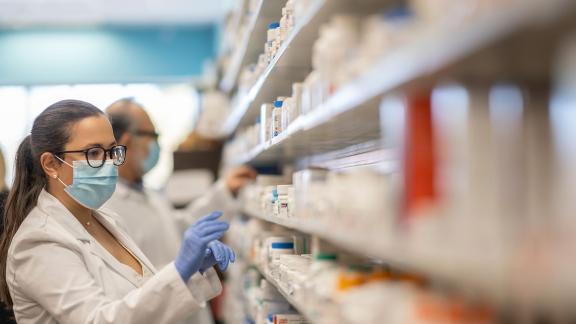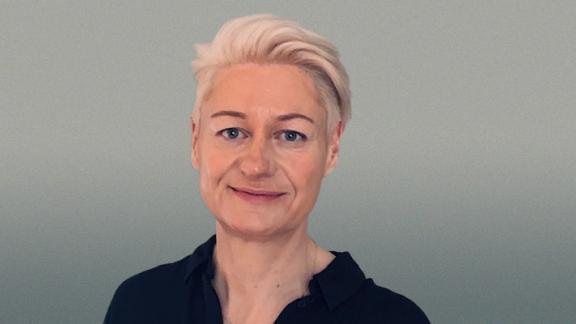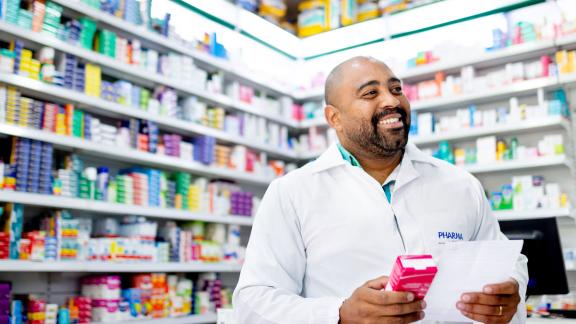Community pharmacy, primary care and the Omicron fightback

Some parts of the media would have us believe that general practice has been effectively closed for business since the pandemic began. All of us in general practice, explains Sarah Jarvis, know the reality is very different indeed.
As the NHS approaches another winter, primary care will be dealing with an expanded booster programme, business-as-usual GP appointments, additional winter pressures and a bigger-than-ever annual flu vaccination programme. All this adds up to huge pressure on appointments – and that's before we've even factored in the uncertainty the Omicron variant brings.
One innovative way we can ease pressures on primary care is to encourage general practices to implement the GP Community Pharmacist Consultation Service (CPCS).
What is the GP CPCS?
GP CPCS offers patients minor illness consultations with a community pharmacist within one working day and is widely used to refer patients contacting 111 with minor illness queries to local community pharmacies. The service allows GP teams to refer patients presenting with minor illnesses directly for a consultation with their local community pharmacy, where appropriate.
Given that it is a condition of the Winter Access Funding that practices sign up to deliver CPCS, primary care networks (PCNs) are developing plans for increasing appropriate referrals through to community pharmacies via the GP CPCS. In October 2021, about 44 per cent of GP practices were planning to operationalise the service or were actively making referrals.
How will it help general practice?
It is estimated that 6 per cent of all GP consultations (20.4 million appointments per year), could be safely managed by a community pharmacist. Offering these patients a formal referral to, and appointment with, a community pharmacist can allow them to be seen more quickly than if they waited for a GP appointment. Appointment time freed up can be used to see patients with more complex medical needs.
There is good evidence that advice provided by community pharmacists about minor illness results in the same outcome as if the patient went to see their GP or attended an emergency department.
In my own area, we have definitely seen an increase in consultation rates for minor illnesses in the last few months. So many patients don't realise that a pharmacist can supply many of the same medications for minor illness they would get on prescription from a GP. Nor do they know that pharmacists are highly trained to deal with minor illnesses.
As a consequence, receptionists often find themselves pushing against an open door when they explain to the patient that they will usually be able to get a consultation much more quickly with a pharmacist than with a GP. When I speak to patients who have previously used CPCS, almost without exception they sing its praises. It really has made a positive difference to receptionists to have another service to offer patients, reducing the need to tell patients to call back.
How it works
When a patient with minor illness symptoms contacts their GP practice requesting an appointment, the care navigator or receptionist can refer them directly to a local pharmacist of their choice. Brief structured symptom checklists can help identify patients who can be safely referred. With the patient’s consent, the practice team can send an electronic referral message to the pharmacy the patient has chosen, to support safe follow up and audit.
Following the referral, the patient can be advised to contact the pharmacy and sent details of their referral electronically. If they do not make contact, the pharmacist will contact the patient within 12 hours by phone and either carry out the consultation by telephone or arrange a video consultation or for the patient to attend the pharmacy, if appropriate.
Somerset CCG is in the early stages of embedding CPCS across the whole county using local services (currently known as Patient Access Connect), which provides an integrated triage tool and automated referral to any participating pharmacy. It is already seeing huge success. Between June and September 2021, around 2,500 patients were successfully referred for a personal consultation with a community pharmacist of their choice.
For Ed Garvey, who is part of the CCG’s primary care team, having the option to assess a patient referral using a clinically-designed assessment tool means that “receptionists and practice teams have the added confidence that they can refer to this tool when they need some reassurance.”
GP Dr Jeremy Imms has remarked on the “huge cost saving to the practice, as each referral is saving a clinician’s appointment. By broadening access to the wider primary care, patients are getting a better service and we are taking a little bit of pressure out of GP surgeries.”
For Michael Lennox, a community pharmacist in Somerset, the CPCS service is “beginning to make a discernible difference in channel shift. We are convinced that our partnership-working philosophy has enabled us to achieve at-pace and best-in-class practical delivery.”
Implementing the CPCS
Practices can start referring into the CPCS straight away, as soon as the secure electronic referral process has been agreed with local community pharmacies. There is lots of support available through your local implementation lead or on FutureNHS. EMIS practices wishing to use local services can contact their local EMIS team.
Dr Sarah Jarvis MBE FRCGP is a general practitioner, broadcaster and television doctor. You can follow her on Twitter @DrSarahJarvis
Related resources
- The GP/PCN communication toolkit provides a practical guide on implementing the minor illness referral pathway from general practice to NHS CPCS.
- A co-badged briefing note explains how the GP referral pathway works and how to implement it in PCNs and practices.
- The full service specification.



